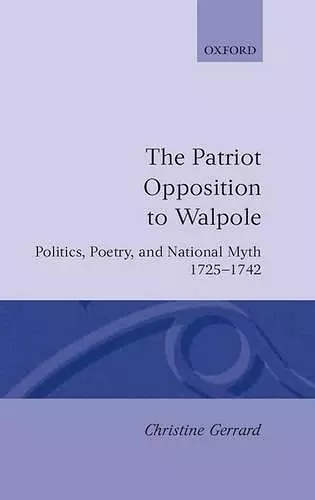The Patriot Opposition to Walpole
Politics, Poetry, and National Myth, 1725-1742
Format:Hardback
Publisher:Oxford University Press
Published:8th Dec '94
Currently unavailable, and unfortunately no date known when it will be back

What did it mean to be a `Patriot' during the Walpole administration? This is the first full-length study of the so-called Patriot opposition to Walpole which reached its height during the clamour for war against Spain at the turn of the 1730s. The book examines the interrelationship between patriotism, politics, and poetry in the period 1724-1742. Christine Gerrard investigates the growing Patriot opposition during the Walpolian oligarchy, and asks whether a broad credo united all of Walpole's political opponents, or whether there was a distinction between Whig and Tory Patriots. The role of Frederick Prince of Wales as the campaign's cultural and political figurehead (Bolingbroke's visionary `Patriot King') is discussed, as are the poetry and drama of such authors as James Thomson, Alexander Pope, and the young Samuel Johnson, who were all drawn to the heady idealism of the young Boy Patriots. Thomson's Rule Britannia and Johnson's London exploit the appeal to British history so central to the emotive propaganda of the Patriot campaign. Drawing on the literature, prints, architecture, and statuary of the 1730s, Christine Gerrard also discusses two of the decade's most powerful romantic patriotic myths - Gothic liberty, and Elizabethan greatness - and reveals that in its nationalistic emphasis upon Nordic and Celtic traditions, the figure of the ancient British Druid, and native `bards', Patriot literature anticipates the `Gothic' strain emerging in the poetry of Gray, Collins, and the Wartons only a few years later.
This helpful volume provides another demonstration of the value of integrating historical and literary studies...Gerrard keeps faith with the complexities, inconsistencies, and ambiguities of humankind and its artifacts. * Albion *
a significant contribution to the growing corpus of scholarship on the genesis of British nationalism in the 18th century. * Times Higher Education Supplement *
This is the first book-length study of Patriot art and politics, and performs the valuable task of isolating and elaborating upon a distinctive cluster of cultural achievements. The Patriot Opposition to Walpole is particularly conscientious in the way it anticipates artistic developments by post-Walpolean writers, and thus has important things to say about artistic manoeuvrings in the century as a whole. * Karen O'Brien, Cardiff University, British Journal for Eighteenth-Century Studies, Vol. 19, part 2 *
There is much to admire in the careful scholarship and the imaginative appreciation of literature and the arts that she brings to this well-written study. * H.T. Dickinson, University of Edinburgh, EHR Apr. 97 *
Dr Gerrard offers a valuable account of 'different aspects of perhaps the distinctive hallmark of the Patriot literary programme - its imaginative engagement with British myth and legend' ... this is really a work of 'historicist' ... literary criticism, in which Dr Gerrard increases our understanding of the ideological underpinnings of 'Patriot' poetry ... Dr Gerrard has new things to say about poets with whom we thought we were familiar. * J.A. Downie, Goldsmiths College, London, Parliamentary History, 13,3 (1996) *
lively and wide-ranging study of the literary culture of the 'Patriot' opposition to Walpole ... This study surpasses its predecessorts ... in the precision with which it invokes the historical foreground of the period ... Throughout, the reader is shown how events in the domain of politics do not determine literary practice, but create realities to which writers respond with varying degrees of wit and imagination. * David Womersley, Jesus College, Oxford, RES New Series, Vol. XLVIII, No. 190 (1997) *
ISBN: 9780198129820
Dimensions: 241mm x 159mm x 21mm
Weight: 575g
288 pages